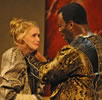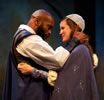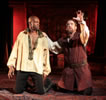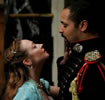Othello
By William Shakespeare
Written between 1602 and 1604 and first printed in a 1622 Quarto
Act I, Scene 1
Roderigo is angry. He's a young nobleman of Venice who has set his romantic sights on a Venetian lady named Desdemona, and he enlisted the help of a soldier named Iago to be his liaison and deliver his gifts to her. However, in the middle of the night, he's learned that Desdemona has just eloped with Othello, a Moor who serves Venice as a general in its army. Roderigo wonders why Iago, Othello's ancient (a military rank, similar to a senior noncommissioned officer today) who claimed to despise the general, didn't see this coming and didn't stop it from happening. Iago assures Roderigo he does hate Othello. His reason: Despite Iago's long service with Othello and obtaining the endorsements of three noblemen, Othello passed him over for promotion to be his lieutenant and instead chose a Florentine soldier named Michael Cassio, an accountant. Nevertheless, Iago continues to serve the general: "I follow him to serve my turn upon him," he tells Roderigo. They are at the house of Brabantio, Desdemona's father and a senator. Iago causes a ruckus to awake Brabantio and tell him of his daughter's elopement with Othello. Brabantio at first doesn't believe it, especially when he learns that Roderigo is one of the rousers—Brabantio doesn't like Roderigo. However, Iago (remaining anonymous) urges the senator to check his house, and Brabantio discovers that his daughter, indeed, is missing. Iago tells Roderigo where Othello is lodging and heads there himself so that he doesn't appear to be betraying his general. Roderigo and Brabantio, who now rather likes Roderigo, follow soon after.
Act I, Scene 2
Iago warns Othello that Brabantio will try to divorce him, but the group that arrives first is led by Cassio with word that the Duke has summoned Othello for a war council. Brabantio shows up next and, after a near-skirmish among their troops that Othello quells, orders that Othello be arrested. Othello replies that he already has been summoned to the Duke, and Brabantio learns from one of the officers that he, too, has been requested to attend the council.
Act I, Scene 3
The Duke and senators are reviewing intelligence reports about a Turkish fleet heading toward Cyprus, a Venetian trading post. Othello, Brabantio, and the rest arrive, and Brabantio insists on prosecuting Othello for bewitching, abusing, corrupting, and stealing his daughter. Othello confirms he has married Desdemona and sends Iago to bring her to the assembly. Meantime, Othello describes courtship of Desdemona: how Brabantio often had invited Othello to his house to tell the story of "the battles, sieges, fortunes that I have passed"; how Othello noticed that Desdemona seemed intrigued with these stories; how she asked him to retell them to her; how she expressed great pity and admiration for him; how she told him that such stories would be the way to woo her if he were so inclined; how he got the hint; how marriage inevitably followed. Desdemona arrives, confirms that Othello is now her husband to whom she owes a duty before her father. Brabantio disgustedly gives way and the Duke turns to the military crisis, informing Othello he must deploy with a force to Cyprus this night. A brief discussion arises over where Desdemona should reside while he's deployed: The Duke suggests her father, but first Brabantio, then Othello, and then Desdemona reject that idea. Her wish is to accompany Othello to Cyprus, which is granted. Because Othello must leave immediately, he turns Desdemona over to Iago and his wife, Emilia, to convey her to Cyprus. Everybody goes their ways except Iago and Roderigo, who has seen all that transpired and now intends to drown himself. Iago assures him that he can still have Desdemona, if not as his wife then as his mistress, and convinces him to "put money in his purse" and sail to Cyprus with him, which Roderigo agrees to do. Left alone, Iago speaks a soliloquy, first revealing that he has been conning Roderigo all the while, pocketing the gifts intended for Desdemona, and then confirming that he hates the Moor and intends to get back at Othello, not only for not being promoted but also for a vague rumor that Othello may have had an affair with Emilia. Iago works out an idea to make Othello jealous via an assertion that Cassio is "too familiar" with Desdemona, thereby pursuing his grudge against the new lieutenant, too.
Act II, Scene 1
In Cyprus, Montano and his troops are prepared for the arrival of either the Turkish fleet or reinforcements from Venice when they get word instead that a storm has wreaked havoc on the Turks. Cassio arrives, bringing word that the storm dispersed the Venetian fleet, too. A second ship arrives, and this one is carrying Iago, Desdemona, Emilia, and Roderigo—remember, they sailed after Othello left Venice, so arriving before he does is cause for worry. Desdemona, trying to show courageous spirit, teams with Iago for some witty repartee to while the time until a third ship puts in. This one brings Othello, who first and foremost greets his wife with a passionate kiss, then announces the wars are done as "the Turks are drowned." As Othello leads Desdemona and his Cypriot friends to the citadel to settle in and celebrate, Iago stays behind to tell Roderigo that he has learned Desdemona is in love with Cassio, so Roderigo must assist in getting rid of the lieutenant. Iago schemes to ply Cassio with wine and, because the newly promoted lieutenant can't handle alcohol well, have Roderigo pick a fight with him and cause an embarrassing brawl. Roderigo agrees to the plan and departs. Iago works out his strategy to inspire Othello to jealous madness in a stream-of-conscience soliloquy.
Act II, Scene 2
A herald announces that with the destruction of the Turkish fleet and in celebration of the general's nuptials, everybody should party.
Act II, Scene 3
Othello and Cassio go over the defense posture of the island before Othello retires for his postponed wedding night with Desdemona. Iago convinces Cassio that before they set the watch, they should first drink a health with Montano and their Cypriot hosts. Cassio reluctantly agrees. As the soldiers engage in drinking games and singing, Cassio gets quite drunk. He heads off to his duties—giving Iago a chance to gossip about the lieutenant's penchant for excessive drinking—but soon comes back in a rage chasing Roderigo. As Montano intervenes with Cassio, Iago gets Roderigo away to raise an alarm. Meantime, Cassio fights with and wounds Montano. Othello arrives in a roar, and when Cassio doesn't fess up and Montano is too hurt to talk, Othello demands the truth from Iago, who, with seeming reluctance, describes what he saw, which had the obviously drunk Cassio as the instigator. Othello fires Cassio on the spot and heads back to bed with Desdemona. Cassio is crestfallen, certain his reputation is ruined, so Iago encourages the now ex-lieutenant to appeal to the "general's general," Desdemona. Cassio thinks that's a great idea—and it is a good idea, as Iago points out in his subsequent soliloquy; it's how Iago will frame the appearance of Cassio's soliciting Desdemona that will make it a bad move in the eyes of Othello. Roderigo returns, none to happy with the beating he's taken at Cassio's hands, but Iago tells him Cassio has been cashiered, so if Roderigo shows patience he will have Desdemona yet.
Act III, Scene 1
Cassio has some musicians play for Othello and Desdemona, whereupon a Clown comes along and engages in obtuse puns and obscure insults with the musicians and Cassio. Musicians and Clown leave, Iago greets Cassio and fetches Emilia for him. Emilia tells Cassio that Desdemona is already advocating for him and promises to set up an audience with her.
Act III, Scene 2
Othello gives letters to Iago to send back to Venice via a departing ship.
Act III, Scene 3
Desdemona, with Emilia in attendance, promises Cassio that she will intercede for him with her husband. That husband enters with Iago, and Cassio leaves. "Ha? I like not that," Iago says as if to himself, but when Othello pursues Iago's thoughts, the ancient says he meant nothing by it. Othello thinks he saw Cassio leaving, but Iago says that Cassio wouldn't "steal away so guilty-like, seeing your coming." Desdemona then confirms Othello's observation, as she notes Cassio was just there and wishes to meet with Othello to earn his place back. At first Othello simply dismisses her request, but as she presses in a teasing manner he seems ready to relent; but then he asks her to leave so he can take care of some business, and she does. Iago, subtly, goes to work, first learning from Othello that Cassio was his go-between in his courtship with Desdemona. At first Iago never says anything explicitly, just muses in half-sentences and vague replies as Othello pries into Iago's meaning. Hesitatingly, and only after much prodding from Othello, Iago comes forth with a warning to Othello to look to his wife with Cassio. He just as quickly warns Othello to beware jealousy as "the green-eyed monster, which doth mock the meat it feeds on." Thus does Iago plant doubt in Othello's mind, the first stage to suspicion and on to conviction. After Iago leaves, Othello reveals in a soliloquy that he is on his way to suspicion.
Desdemona and Emilia enter, and Desdemona again begins plying her husband on behalf of Cassio, which now rubs Othello the wrong way, and he, in turns, rubs at a pain in his head. Desdemona pulls out a handkerchief stitched with a strawberry design as she tends to him, but he pushes it away—the handkerchief dropping to the floor—and leaves. Desdemona follows, and Emilia, seeing the handkerchief, picks it up, noting that Iago has been asking her to obtain it for him for some reason, and when he returns, she gives it to him. In a soliloquy, he works out his plan to plant the handkerchief in Cassio's lodging.
But Othello is returning and already is in a fix. He's well into the suspicion stage and angry with Iago for suggesting his wife is unfaithful and orders him to prove it. Iago casts himself as a martyr for simply telling the truth, but to do his duty to his general he describes Cassio talking in his sleep about conspiring with Desdemona against Othello and engaging in sexual activity. Iago then asks Othello about a certain handkerchief with strawberry stitching, which Othello reveals was a family heirloom and his first gift to Desdemona. Iago says he thought he saw Cassio with it. With this, Othello is already convinced. He kneels and vows revenge on his wife and ex-lieutenant. Iago kneels, too, and vows assistance to his general. Othello orders him to kill Cassio. "My friend is dead," Iago replies. Othello promotes him to lieutenant.
Act III, Scene 4
Desdemona is seeking out Cassio, but the Clown engages her in some lame punning before leaving to fetch Cassio for her. Desdemona is actually exasperated over misplacing her handkerchief. Emilia says she hasn't seen it. Othello arrives and riddles with Desdemona about the moistness of her hand. He complains of a "salt and sorry rheum" and asks her for her handkerchief. She gives him one, but it is not the one he wants. "That which I gave you," he says. She doesn't have it, she replies, but she refuses to say it is lost. He tells her the family history of that handkerchief, how it was sewn by a 200-year-old prophetess and dyed in mummy, and that if the bearer did not keep it with her, her husband would hold her in loathing. Desdemona is shaken by this, but then figures he's just playing with her to put off her suit for Cassio. She presses for him to meet with Cassio. He demands the handkerchief. She won't answer his demand. He keeps demanding the handkerchief. Finally he storms off. Desdemona is totally baffled as Cassio arrives with Iago. She tells Cassio that the general is too angry to press his case right now, and hearing of this Iago leaves to check on Othello. Desdemona, though wondering what could be bothering Othello so much, tells Cassio she will yet fetch her husband for him, and she and Emilia leave Cassio alone. As he's waiting, Bianca shows up, a young woman who resides in Cyprus and is reported to be a prostitute, but she and Cassio clearly have a love thing going. Right now, though, he asks two things from her: one, that she leave him at once so that he would not be seen with her when the general arrives; and two, that she take this lovely handkerchief he found in his chamber and have it copied for him. Bianca worries that the handkerchief is a love token from another woman, but she accepts the assignment.
Act IV, Scene 1
Iago is working Othello's raging psychosis hard. He is now getting graphic in his suspicions and reports of what he says Cassio has told him: that he and Desdemona "Did lie…with her, on her, what you will." Othello falls into an epileptic fit, during which Cassio arrives. Iago reports that this is his second such fit in as many days and that Cassio should not be by when he recovers—but to come back soon for further conversation. Cassio leaves, Othello recovers, and Iago reports that Cassio had been there and would be back. He advises Othello to hide and overhear their conversation. With Othello eavesdropping, Iago starts his conversation with Cassio by reiterating that to get his appeal to the general he should "ply Desdemona well and you are sure on't." Iago then switches to the topic of Bianca. Cassio laughs and makes fun of their sexual relationship. Othello already is misinterpreting what he is hearing, as Iago intends, but then even Iago couldn't mastermind what happens next: Bianca shows up in a fit and throws the handkerchief at Cassio, calling it "some minx's token." She leaves in a huff and Cassio chases after her. Othello intends to murder Desdemona with poison: Iago suggests he strangle her in their bed instead. A trumpet announces the arrival of Lodovico from Venice, and he enters with Desdemona and new orders for Othello to return to Venice and turn command of Cyprus over to Cassio. As Desdemona tries to explain to Lodovico how Cassio and Othello have fallen out, Othello gets increasingly angry with her. She tries to mollify him, he strikes her, then orders her away, orders her back when the shocked Lodovico says he shouldn't treat his wife that way, then mocks her supposed virtue. After Othello storms out shouting "Goats and monkeys!" Iago reports to Lodovico that the general has "much changed," and that what they just witnessed isn't the worst of it.
Act IV, Scene 2
Othello interrogates Emilia about Desdemona and Cassio. Emilia insists nothing untoward has taken place between them. He orders her to bring Desdemona in, and while she does so, Othello ruminates that Emilia is part of the conspiracy. When Desdemona arrives, Othello grills her about her honesty and then outright accuses her of being "that cunning whore of Venice that married with Othello." As he leaves, he pays Emilia as Desdemona's pimp. After Emilia learns from Desdemona what Othello has said, she fetches Iago to comfort the general's wife. Iago does so, assuring Desdemona that Othello is upset over affairs of state. Meanwhile, Emilia rails about how Othello is deceived, like that time "some such squire" convinced Iago that she had had an affair with Othello. Iago would rather her drop the topic. After Desdemona and Emilia depart, Roderigo enters. He has concluded that Iago has, in fact, been scamming him, and all he has for his pains is a beating from Cassio and bankruptcy. He tells Iago he plans to ask Desdemona to return his gifts (which, of course, she never got), and if she doesn't return them "I will seek satisfaction of you." Iago lauds him for showing such mettle and not only claims that, though it doesn't appear so, "I have dealt most directly in thy affair." And now that Roderigo is showing such mettle, Iago needs him to apply it—against Cassio. Iago directs Roderigo to lay an ambush of Cassio when he leaves Bianca's place after supper. Iago promises to second Roderigo if Cassio escapes.
Act IV, Scene 3
As Othello and Lodovico plan an after-dinner walk, Othello sends Desdemona to their chamber to immediately prepare for bed and dismiss Emilia. Emilia herself is surprised at this command, but Desdemona is intent on not crossing her husband, and even asks Emilia to lay out the wedding sheets on the bed. As Emilia helps her undress, Desdemona remembers her mother had a maid named Barbary who had a love forsake her, and Desdemona now sings a sad song the maid used to sing. The two talk about women committing adultery; Emilia says she would do it "for all the world" because, if nothing else, that would make her husband an emperor. Desdemona is adamant that she would not cuckold her husband for anything.
Act V, Scene 1
Iago and Roderigo set their trap for Cassio. When Cassio comes along, Roderigo jumps him, but Cassio wounds the assailant. Iago then jumps in unseen and wounds Cassio in the leg. Othello happens to be nearby, and upon hearing Cassio cry is assured that Iago has done the deed. But after Lodovico and Gratiano, Desdemona's uncle (newly arrived in Cyprus), come upon the scene, Iago comes back with a torch. In the hubbub, Iago first assists Cassio, then goes over and kills the wounded assailant, Roderigo (who dies saying "O damned Iago! O inhuman dog!"). They all now identify Roderigo—much to everybody's surprise he is there and would do such a thing—and Bianca enters and goes to Cassio's aid. Iago accuses her of being part of the conspiracy to kill Cassio. Emilia enters to find out what's going on, and after Iago gives her a quick update—and she rails at Bianco for her role in Cassio's undoing—Iago sends her to report the news to Othello and Desdemona.
Act V, Scene 2
Othello enters the bed chamber. Desdemona is asleep. She is gorgeous. Othello must kiss her. She awakes, and he urges her to say her prayers; he will kill her but doesn't want her damned. She protests there's no reason to kill her, and he now lays out the evidence against her and Cassio, including the handkerchief. She tells him to get Cassio's testimony, but he says Cassio has already confessed and is dead. She realizes she is not only defenseless but in grave danger, and as she frantically begs Othello to hold off killing her, he smothers her with a pillow. As he's doing so, Emilia knocks on the door. Othello, certain Desdemona is dead—and the fact that his beautiful wife is dead suddenly strikes him hard—lets in Emilia, who reports on the fracas with Cassio and Roderigo. Othello is at first confused—Roderigo is nothing to him, Cassio still living is a disappointment. Desdemona suddenly calls out and Emilia discovers her gasping her last breaths. Desdemona claims she killed herself and to "commend me to my kind lord." Othello reiterates what Desdemona said—that he did not murder her. But he almost immediately denounces his wife for lying and going to hell and admits to her murder. Othello gives as his reason Desdemona's sexual affair with Cassio that Iago knew all about. Dumbfounded that Othello names her husband, Emilia now calls for help, and Montano, Gratiano, and Iago arrive. Emilia first appeals to her husband to "disprove this villain." Iago, though, admits that he told Othello "what I thought, and told no more than what he found himself was apt and true." He also tells his wife to shut up. But she will rail at these false claims, whereupon Othello brings up the damning evidence of the handkerchief. If you can't imagine the shock charging through Emilia's guts now, then you have to see it. Iago wants her quiet and actually pulls his sword out to reiterate his threat, but she tells the real story of how the handkerchief was lost and she gave it to Iago. Othello makes for Iago, Montano disarms Othello, and in the bustle Iago stabs his wife and flees. Montano runs after Iago and sets Gratiano to guard the door. Emilia dies next to Desdemona. Othello gets another sword and calls in Gratiano. Soon after, Montano returns with the wounded Cassio along with Iago now under arrest. Othello charges at and wounds Iago, and is again disarmed. Iago does not die. But even after the full truth is now known, confirmed by Cassio, Iago refuses to speak, and the promise of torture fills what's left of his life. Othello reminds the Venetians of his service to the state and asks that in their report they speak "of one that loved not wisely, but too well; of one not easily jealous but, being wrought, perplexed in the extreme." He also wants the report to include how he once smote one of Venice's enemies with a knife, which, with a knife he had hidden, he now does to himself. He falls on the bed and dies kissing Desdemona.
Comment: e-mail editorial@shakespeareances.com
Start a discussion in the Bardroom













 Find additional Shakespeareances
Find additional Shakespeareances